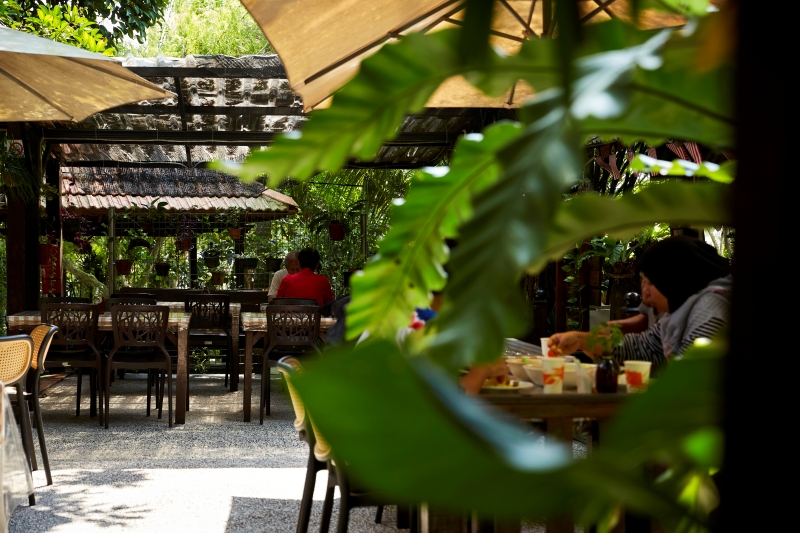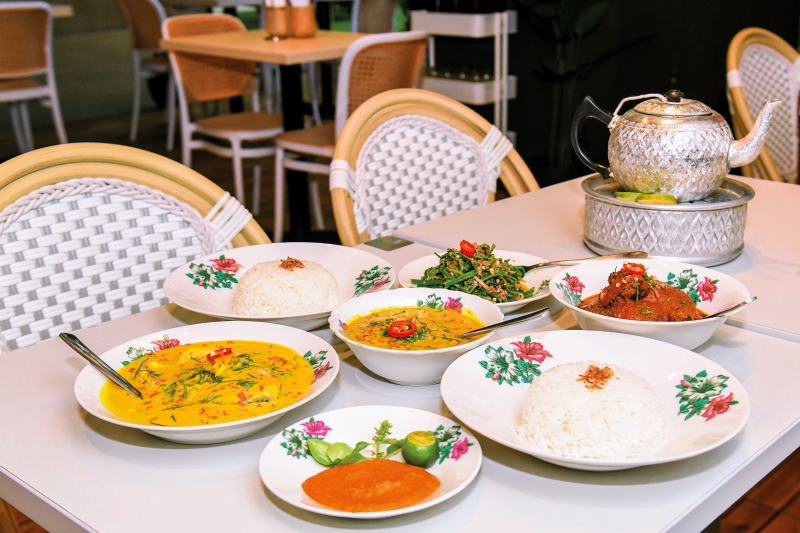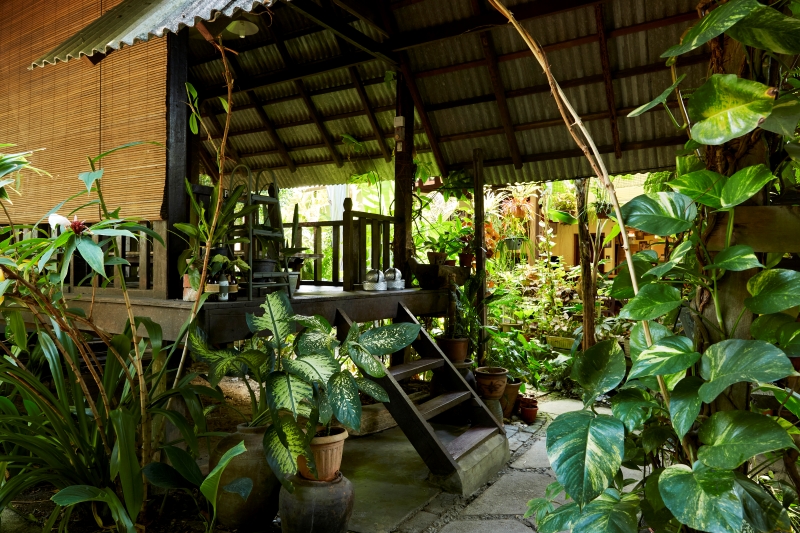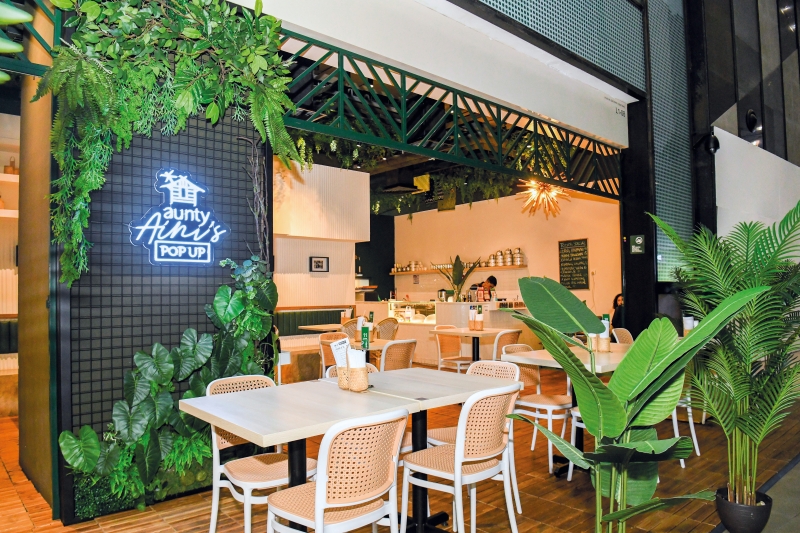
Merlissa Zainal Osman (left) and Norzaini Abd Hamid on preserving traditional Negeri Sembilan food (Photo: SooPhye)
When she was in her thirties, Norzaini Abd Hamid (fondly known as Aunty Aini) came across a section in a local newspaper that highlighted anecdotes by random people. “This must be almost 35 years ago. News outlets would sometimes publish stories by anyone who tak puas hati about something. There was a guy from the north who came to Port Dickson [in Negeri Sembilan] for a holiday with his family. He was looking for a place to eat masak lemak, but tak ada.”
That lament sparked her desire to open a restaurant specialising in cuisine from her birth state one day. But it would be more than a decade before she established her now-iconic home-based eatery in Nilai. And last October, the restaurant debuted its pop-up at DC Mall in Bukit Damansara, Kuala Lumpur, helmed by eldest daughter Merlissa Zainal Osman.
Born in 1959, Aini traces her roots to Suku Biduanda, the oldest of the 12 Minangkabau ethnic groups in Negeri Sembilan. Her childhood home in Kampung Chelet was surrounded by cultivable paddy fields, jungle and farmland, so access to organic produce was unlimited. “My mother never brought us out to eat because she cooked everything at home. We lived in the kampung and growing up, we had our own sawah padi and sourced most things like chicken, eggs, beef and lamb from our land.”
While she did not start cooking at a young age — “We all went to school and didn’t really have the time, but would observe mum and grandma in the kitchen” — she picked up the skills after getting married at 18. “I had no choice but to learn because I kept thinking about the things grandma said. Even if you are a rocket scientist, if you don’t cook, she would not be impressed.”
_s1a5138a.jpg

The origins
Aini migrated to KL to pursue a career as an actress and a host. After some years, she returned to her hometown, where the sense of familiarity and peaceful nature were more suitable for nurturing her children. “I decided to come back more than 25 years ago to raise the kids in this small town.”
Living in the village away from the hustle and bustle of city life allowed her to rekindle her dream of starting a restaurant. With more time on her hands now, she finally had the opportunity to map out a business plan and think about the concept she wished to introduce after observing the food scene in the state. “Back then, people would sell masak lemak in gerai with a lot of other lauk. I wanted people to sit down, order, then I cook and present the dishes to them.”
Though Aini was a good home cook, she understood that would not be enough for her to run a business, especially with a cook-to-order approach. “If anyone orders masak lemak ikan and I want to prepare it then and there, how do I go about doing it? It would not be practical to make the gulai from scratch because of the waiting time.”
After experimenting for a year, she decided the best way to manage orders efficiently while maintaining the quality of the food was to prepare a pot of paste and partly cook the meat and seafood first thing in the morning. “So when customers want a specific lauk, we would just combine the meat and paste with santan before serving. You cannot reheat masak lemak because it will get oily. That’s why it has to be freshly served.”
In 2004, she launched Aunty Aini’s Garden Cafe on one acre of land inherited from her mother. “I took over the house, built her another home and used half the plot for the restaurant. And my dream came true,” she smiles.
The restaurant, enveloped in lush greenery comprising house plants, spices and herbs, initially occupied a small section of the property. “We did not expect it to grow this big, but within a year, I had to expand the space. The renovations have not stopped — we continue to revamp the place accordingly.”
The café serves Gulai Lemak Cili Api, Gulai Lemak Tempoyak, Asam Pedas, Sambal Tumis Petai and rendang, with chicken, smoked beef and duck, fish and seafood options. Side dishes include goreng kunyit, vegetables and soups. “We added western food early on to accommodate families with children who want to eat that. So I produced home-made burgers, chicken chop and spaghetti. ”
20250128_peo_aunty_aini_sb_14.jpg

Showcase of heritage
Aini’s original goal was to introduce authentic Negeri Sembilan staples to a wider audience while preserving and spotlighting her heritage through food. She admits to being “territorial and possessive” about how she does things in the kitchen. “My cooking is complex. People tend to say, ‘It’s just masak lemak. What is so difficult about it?’ I can give you the recipe and you may still not be able to get the same result. Even though there are only a few ingredients, we don’t simply masak.”
Customers can expect to indulge in dishes prepared using traditional recipes and techniques Aini upholds. “To make daging salai masak lemak, my grandma would smoke-dry the meat, cut it into pieces and boil them with other ingredients until they were tender, before putting in santan. You cannot do that early because it will overboil and turn into rendang.
“I use a lot of coconut cream, which is getting expensive. Masak lemak ni tak boleh cair. Sometimes, I notice the santan and water separating. It shouldn’t be like that. All the ingredients have to be mixed well together.
“That’s why, when I see younger people who open masak lemak restaurants but don’t follow the old cooking method, it makes me angry. I do call them out sometimes, but they tend to say, ‘Suka hati kita lah (I’ll do as I please),’ which disheartens me. I would be more than happy to share my knowledge if they were willing to learn.”
Running the café gives Aini the opportunity to meet like-minded customers. “I’m very fussy. I eat my own cooking most of the time. Setting up this type of restaurant works because there are a lot of people who don’t want to eat at gerai that sell all sorts of lauk.”
She welcomes regulars and diners from different countries and races. “Forty per cent of my customers are non-Malay, so my shop will always be occupied during Chinese New Year celebrations. Nilai is also multinational as there are a lot of expatriates working at German, French, American, Singaporean, Japanese and Korean companies here.”
Meeting people from diverse backgrounds is the most rewarding part of running the business. “I have the best customers,” Aini proclaims. “We have new visitors almost every day but there are those who used to come by when they were younger, who ask if I still remember them. Even after they have finished studying, started working or married, they still come to eat here.”
_s1a5110a.jpg

While we are enjoying the dishes at her residence located at the back of the premises, some customers walking around the property stop in front of the house to take pictures, unaware that it is not open to the public. Nevertheless, Aini greets them with a big smile, thanking them for popping by. “It’s fun to have a restaurant where my house is. If any guest is looking for me, I can just go down, meet them or bring them to my home,” she says.
Her friendly personality encourages diners to chat. She takes note of their reviews and feedback, most of which are positive. The most frequent remark: “Aunty, your masak lemak is different from that at most places.”
Attentive customers also appreciate the fact that the dishes do not contain sugar, an ingredient Aini particularly avoids using in her recipes. “A young Chinese man told me, ‘Aunty, thank you so much for not putting sugar in your food’.”
In 2015, when MasterChef UK judge John Torode and his entourage came to shoot a 10-part TV series called John Torode’s Malaysian Adventure at her place, they pointed out the same thing. “They went around the country first and I was the last personality they visited. We featured Raya food, so I cooked lemang and rendang from scratch. The crew said it was the best food they had had in Malaysia so far because [what] they had elsewhere was sweet.”
Aini is recognised by local and international F&B experts alike. Besides Torode’s show, the restaurant has been featured on Gordon Ramsay’s travelogue foodie series, Gordon’s Great Escape, where she taught the British chef a traditional beef rendang recipe and famously told him off: “Be patient” and “Don’t burn my rendang!” Aini also hosted the late chef Anthony Bourdain twice for his shows No Reservations and Parts Unknown.
_s1a5214_1a.jpg

Help through hardship
For 15 years, Aini was in and out of the kitchen, managing service, people and finance. “At one point, I was doing everything because I could not trust someone else to help me with most of the work. Eventually, that affected me. I suffered from a slipped disc 10 years ago, got really sick and was paralysed for a couple of months.”
The incident forced her to accept help from her family — children and siblings alike — as well as welcome outsiders to assist with kitchen matters. “My elder sister stepped in; she’s my food consultant and is good at making rendang. She helped me train a new cook to specialise in the dish to lift a weight off my shoulders. Because rendang takes too long to make, I cannot be the only one doing the cooking.”
Aini is blessed with three daughters and two sons who share her passion and love for Negeri Sembilan cuisine and can always be expected to lend a hand. “I don’t force them to do anything. You cannot paksa your kids to do what they don’t want to do. I am lucky to have my second son handling the business now. Another one working at Subang airport comes over the weekend to help his younger brother.
“So now, I’m a bit more relaxed. My son takes care of the business, I take care of the compound. He only cares about his work — if something is broken, he doesn’t see that. So I have to be the one to go around and check on things. Besides that, my job is just to entertain customers.”
With her reputation and experience, Aini is sometimes invited to guest on cookery shows. As she lives near her siblings, she often asks them to accompany her to do a presentation or provide catering services. “I used to bring my sister. She would be my sous chef because I cannot talk and cook at the same time, right? So she would make rendang while I blabbed on stage. Now I cannot do it anymore as she has just got married, at 71,” she divulges.
“Recently, Sime Darby invited me and chef Ismail [Ahmad] to prepare food and present a cooking demonstration at [luxury retreat] Planter’s Haven. I asked my brother, an ex-army [officer], to help out. I told him, ‘The pay is good. Can you be my assistant for two days?’ Thankfully, everyone in the family pandai masak,” she says proudly.
20250128_peo_aunty_aini_sb_3.jpg

Branching out
Merlissa, 47, recalls learning to make asam pedas when she was 12. “I remember I would hang out in the kitchen with mama and grandma, just watching them rustle up dishes for the family.”
Aini says she is the only daughter who has picked up her traditional Negeri Sembilan cooking skills and strictly follows the methods. Like her, Merlissa is also fussy about the food she eats. She was scouted to be a model at 16 and travelled and lived in Singapore, Indonesia and Hong Kong for most of her career.
“When I was far away from home, I would call mama to ask how to make this and that. Mat Salleh food is very easy to make; the Malay dishes are usually more challenging because there are so many components to consider. You have to know the exact time to put in the ingredients, one after the other,” Merlissa says, adding that the best trick she mastered from mum is the agak-agak (guesstimate) technique.
Last year, she presented to her mother and brother her plan to open a branch in KL, in partnership with friends from the fashion industry. “I think it is about time we introduce Aunty Aini’s authentic flavours to more people.”
But they were not easily persuaded. “It took me a few months to convince them to bring the restaurant to KL because mama was cautious about her brand and wanted to keep it in the family, which I agreed with. I had to assure her that my friends would not cheat me.”
“Unless it is my own flesh and blood who want to expand the business, I am fine with running just this one in Nilai. Franchising is not really my thing. Even if the food comes from my kitchen, something can surely go wrong,” Aini remarks.
20250128_peo_aunty_aini_sb_8.jpg

The pop-up at DC Mall boasts a distinctive set-up compared to the original restaurant. The walls are lined with black-and-white photographs of the family from different periods and the interior features a clean, contemporary aesthetic. Modern elements aside, Merlissa maintains the traditional touches with servingware that recreates the experience of eating at home, and aluminium hand-washing pots commonly used at events in villages. “Food brings back good memories and it is important to emphasise that sense of nostalgia through our presentation as well.”
After the store’s lease ends in May, she hopes to explore other locations with better foot traffic. “Having a brand helps a lot but running an F&B business is not easy. We are thinking of opening a pop-up in different locations such as Ampang and Shah Alam, and eventually venture out of the Klang Valley.”
Aini welcomes this expansion plan as it increases brand awareness. “To me, masak lemak is an art. I want everyone around the world to try my cooking. Maybe one day, we can open a branch overseas.” She also hopes to organise cooking classes in the near future, to teach some of her signature dishes to the younger generation.
When she is not entertaining guests or checking on the restaurant, the matriarch travels or just stays home with her children and grandchildren. While she may have fewer responsibilities at Aunty Aini’s Garden Cafe now, her eight-year-old grandson keeps her occupied by making her cook every other recipe he sees online.
Aini is also concerned about her weight — 5kg more than her ideal figure — but she cannot deny her love of good food. “Food is heaven. It’s our culture and our pride, especially for Malaysians.”
This article first appeared on Mar 24, 2025 in The Edge Malaysia.


